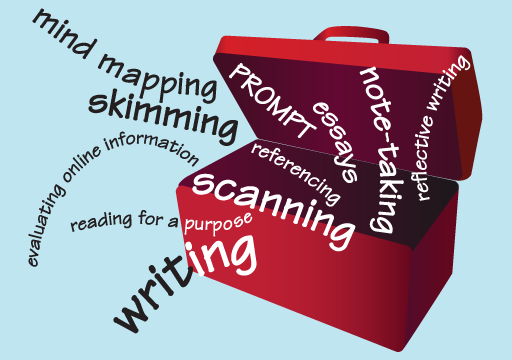1.1 Reading, writing and note-taking
Reading and writing are probably the first things you think about when someone mentions studying – whether it is reading and typing online or sitting down with a book and a pen.
Note-taking is an important aspect of academic studying. It is a way of organising the ideas and information we have learned about, and our thoughts and reflections. Most people develop their own personal way of note-taking, and you might have done so already. As long as it works for you, that is fine!
But remember that notes need to be concise. There is no point just copying most of the material you are reading and you can waste a lot of time by doing this. They also have to be useful and do what you want them to do. Have a think why you are reading something, and what you intend to do with the information you are noting down.
Here are four stages of reading and note-taking, which many students have found helpful:
1 Skimming
Let your eyes run quickly over the text to get the gist – ‘skimming the top off’ whatever you are reading.
2 Scanning
If you are wanting to answer a quiz or an essay question, think about what you might need for that and scan for relevant areas of the course. Scanning the headings, menus or chapters is a good way to start. Maybe some words are shown in bold or italics because they are seen as special terminology for the subject you are studying.
3 Focused reading
Then return to some of the points you identified in your scan, and read them more closely. Make sure you understand them, and think about how they may relate to each other.
4 Writing down your notes
Now make your notes. You may want to use mind mapping – this is the focus of the next section – or bullet-points to organise your thoughts.
Activity 1 Scanning for this week’s activities
- Take a quick look through the rest of this week of Succeed with learning. Just look out for the activities.
- Make a note in your learning journal about the number of activities and the amount of time they are likely to take.
Discussion
Scanning is a useful way of searching for specific information. You do have to be careful not to be distracted by anything that is irrelevant, though!

